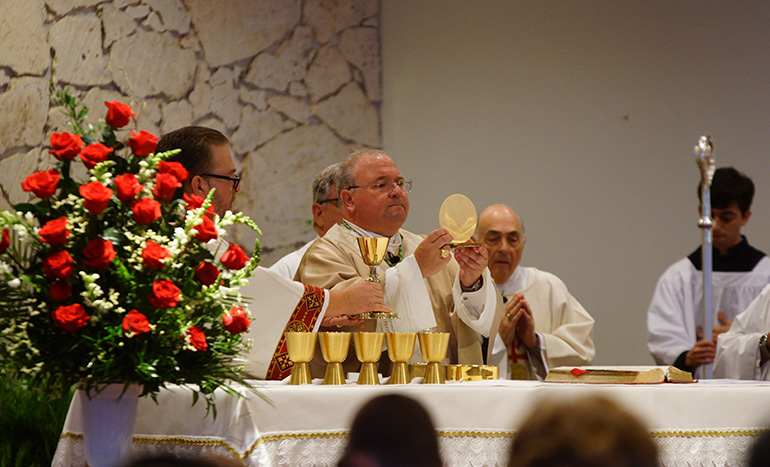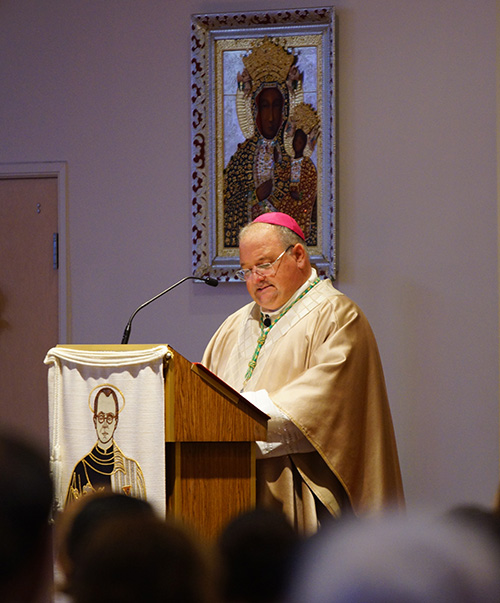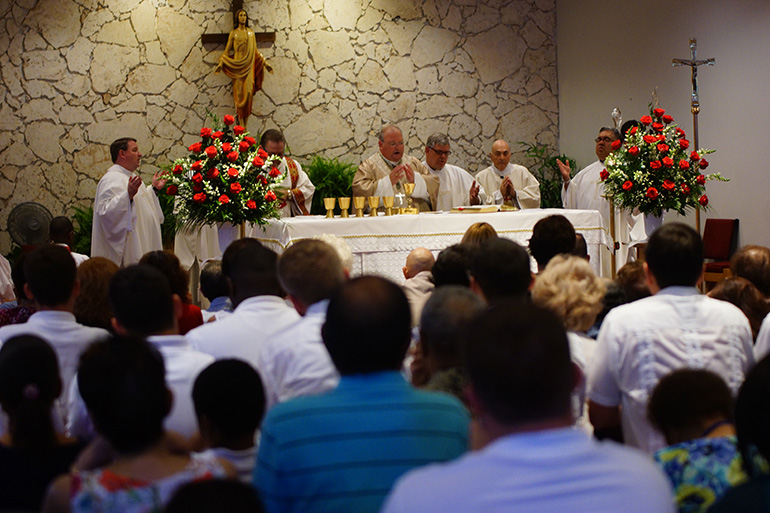By Bishop Peter Baldacchino -

Photographer: COURTESY | Sister Elizabeth Worley
Miami Auxiliary Bishop Peter Baldacchino celebrates Mass at St. Maxiimilian Kolbe Parish in Pembroke Pines on the 75th anniversary of the saint's death in Auschwitz.
Auxiliary Bishop Peter Baldacchino preached this homily while celebrating Mass Aug. 14, anniversary of the death of St. Maximilian Kolbe, at his namesake parish, St. Maximilian Kolbe in Pembroke Pines.
Thank you Father Jeff and parishioners of St. Max, for your invitation to share this day with you and for your warm welcome ever since I arrived. Today you recall the 75th anniversary of St. Maximillian Kolbe’s martyrdom, his “dies natalis” – the annual commemoration of a Christian martyr's death, his birthday in heaven, enjoying the glory of God and contemplating His countenance!
Born in Poland in 1894, when he was old enough to answer God’s calling, Maximilian joined the religious congregation of the Franciscans. By 1927 (at age 33), he had founded a house for those who wished to enter the religious life. In 1941 (at about 47 years of age), while appointed as the superior of the Polish community, he was arrested by the Gestapo and imprisoned at Auschwitz.

Photographer: COURTESY | Sister Elizabeth Worley
Miami Auxiliary Bishop Peter Baldacchino delivers his homily at St. Maxiimilian Kolbe Parish in Pembroke Pines on the 75th anniversary of the saint's death in Auschwitz. The icon of Poland's Black Madonna, Our Lady of Czestochowa, is behind him.
Twelve weeks after his arrival at the prison camp, a prisoner escaped. In retaliation, ten men were chosen at random to die of starvation. One of the chosen men was a young father of a family. Father Maximilian stepped forward and offered to take the place of the young man condemned to die. The offer was accepted and on August 14, 1941, Father Maximilian died of starvation after suffering with nine others in the prison. An act of self-sacrifice that reveals true Christian love: One man gave his life for another on the Day of Judgment, when the young father was condemned to death. In those who like Father Maximilian have come to know God, the love of God has reached perfection, with the certain conviction that they are in Jesus and that Jesus is in them. St. Maximilian Kolbe was proclaimed a saint of Holy Mother Church as recent as October, 1982.
Now it happens that just one week ago, I returned from Krakow where I had the privilege of participating in World Youth Day with some 500 pilgrims from the Archdiocese and over a million young people from 187 countries. And Father Jeff tells me that some participants from St. Max’s “Life Teen” group actually visited the saint’s prison cell and are witnessing their pilgrimage experiences at every Mass this weekend. What an event that was! …Congratulations!
Well, today's Gospel focuses on the cross. Jesus speaks about his baptism: that is, his passion and death. And St. Paul tells us that he endures the cross for the sake of the joy that lies ahead.
World Youth Day has indeed been a privileged experience — a great blessing — but it does involve some shared suffering: a lot of walking under the hot sun, or the drenching rain; waiting — sometimes long waits, for example, for the food line or when, and in some cases, a bus breaks down and several hours are spent at a service station whose restroom, perhaps, didn't work! Shared experiences, especially shared suffering when accepted patiently, can bring people together. Indeed, the cross unites us!
Along their pilgrimage, our young people were told about the cross; they were challenged to embrace the cross. We became aware of Father Jacques Hamel who ISIS terrorists murdered a few days before. Indeed, the 20th century has seen more Christian martyrs than all other centuries combined.
The blood of the martyrs is the blood of Jesus Christ in our midst. St. Maximilian Kolbe is one of a vast number of modern martyrs. That martyrdom continues even in our times, as the example of Father Jacques Hamel shows. These martyrs — most of them obscured by the immense number of them — remind us of something that we easily forget: Even though we have not suffered as others have, we will not achieve fulfillment or peace without embracing the cross.
So, today we commemorate the 75th anniversary of one of the most famous martyrs. Those of us who visited the Auschwitz Concentration Camp could see scenes of the worst human darkness. But also one scene of astounding brightness: the spot where a Franciscan friar by the name of Maximilian Kolbe gave his life in place of a man who had been condemned to death by starvation. Outside the starvation bunker where he spent his last ten days stands a placard with Kolbe's picture and a description of his heroic act. He died on August 14, 1941. The prisoner Franciszek Gajowniczek, whose life he saved, survived Auschwitz and until his death in 1995 travelled to several places giving his testimony. Indeed, what St. Maximilian Kolbe did for Franciszek, Jesus has done for you and me.
Today I want to underscore the "baptism" of Jesus — his cross. We can say that at the moment of our baptism, each and every one of us is assigned a cross. There is no Christian without a cross! For some, it will be some physical or psychological ailment; for others a rebellious child; yet for others, a situation that provokes and calls to faith.
St. Max shows us that the cross is not the end of life; neither is it the proof of the absence of God from our lives (as many unfortunately tend to assert!). On the contrary, Christ willingly climbed the cross not only to share the same journey that we, as men and women must walk, but in order to open for you and for me at the end of our journey in this valley of tears, the path to true life. His resurrection enlightens and gives hope to our lives, and as St. Max did, so can we too (!) accept our own crosses with the hope, even better — with the guarentee of Eternal life.
St. John Paul II too, by his heroic life, challenges us to live the meaning of our baptism, to embrace our cross. "There is a baptism with which I must be baptized and great is my anguish until it is accomplished." (Lk 12:50) Amen.

Photographer: COURTESY | Sister Elizabeth Worley
Miami Auxiliary Bishop Peter Baldacchino celebrates Mass at St. Maxiimilian Kolbe Parish in Pembroke Pines on the 75th anniversary of the saint's death in Auschwitz. Next to him, at right is St. Max's pastor, Father Jeff McCormick.

